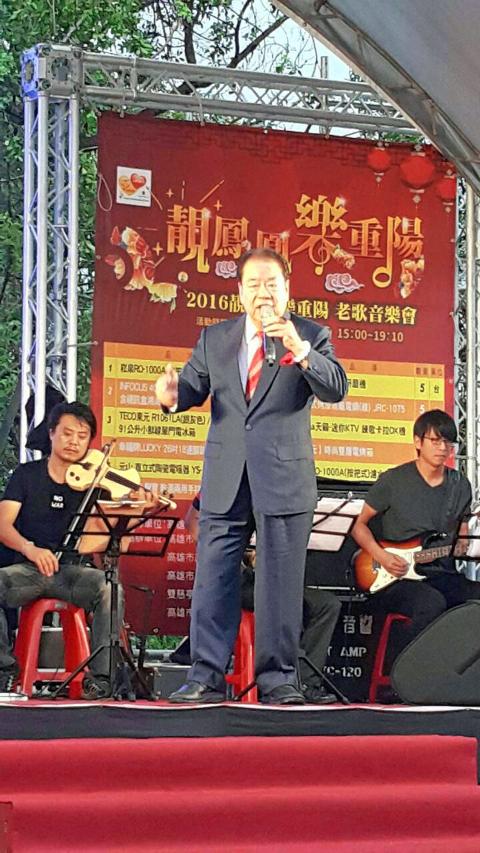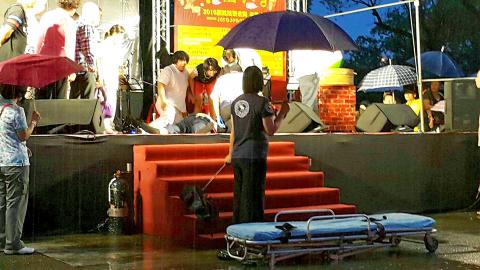Kuo Chin-fa (郭金發), a famous singer who has been a household name since the 1960s, yesterday collapsed during a performance in Kaohsiung and was later pronounced dead at a hospital.
Made famous by his signature song Hot Rice Dumpling (燒肉粽), Kuo, who sang in Hoklo (also known as Taiwanese), was performing at an event in Weiwuying Township (衛武營) in the city’s Fengshan District (鳳山) to mark the Double Ninth Festival, the traditional senior citizens’ day which falls on the ninth day of the ninth lunar month.
According to audience members, Kuo performed his first two songs without incident, but as he started singing his third song, Hot Rice Dumpling, the audience noticed something was wrong.

Photo: Copy by Tsai Ching-hua, Taipei Times
“At first we thought that the microphone had gone dead as there was no sound, but then Kuo fell over on the stage,” an audience member said, adding that that emergency first aid attempts failed to revive the singer and the district office called an ambulance. Kuo was taken to the Kaohsiung Armed Forces General Hospital.
While the event continued and the audience wished the best for Kuo, the hospital pronounced him dead at 7:19pm.
Born in 1944, Kuo discovered his love of singing when he entered a competition as a 15-year-old. He was introduced to the music industry at 17 by Yeh Chun-lin (葉俊麟), a renowned Taiwanese songwriter.

Photo: Copy by Tsai Ching-hua, Taipei Times
Although he released hundreds of albums, Kuo remains most well-known for Hot Rice Dumpling, as well as his rich baritone voice.
Later in life, Kuo started a rice dumpling business in Kaohsiung, but the restaurant has since closed.
Kuo had expectations for his son, Kuo Chien-meng (郭建盟), to become a politician. Kuo Chien-meng was elected a Kaohsiung city councilor twice as a member of the Taiwan Solidarity Union before becoming a part of Kaohsiung Mayor Chen Chu’s (陳菊) team.
In 2010, Kuo Chien-meng was nominated for city councilor by the Democratic Progressive Party and was voted into office. He won a subsequent term in 2014.

CHAOS: Iranians took to the streets playing celebratory music after reports of Khamenei’s death on Saturday, while mourners also gathered in Tehran yesterday Iranian Supreme Leader Ayatollah Ali Khamenei was killed in a major attack on Iran launched by Israel and the US, throwing the future of the Islamic republic into doubt and raising the risk of regional instability. Iranian state television and the state-run IRNA news agency announced the 86-year-old’s death early yesterday. US President Donald Trump said it gave Iranians their “greatest chance” to “take back” their country. The announcements came after a joint US and Israeli aerial bombardment that targeted Iranian military and governmental sites. Trump said the “heavy and pinpoint bombing” would continue through the week or as long

TRUST: The KMT said it respected the US’ timing and considerations, and hoped it would continue to honor its commitments to helping Taiwan bolster its defenses and deterrence US President Donald Trump is delaying a multibillion-dollar arms sale to Taiwan to ensure his visit to Beijing is successful, a New York Times report said. The weapons sales package has stalled in the US Department of State, the report said, citing US officials it did not identify. The White House has told agencies not to push forward ahead of Trump’s meeting with Chinese President Xi Jinping (習近平), it said. The two last month held a phone call to discuss trade and geopolitical flashpoints ahead of the summit. Xi raised the Taiwan issue and urged the US to handle arms sales to

State-run CPC Corp, Taiwan (CPC, 台灣中油) yesterday said that it had confirmed on Saturday night with its liquefied natural gas (LNG) and crude oil suppliers that shipments are proceeding as scheduled and that domestic supplies remain unaffected. The CPC yesterday announced the gasoline and diesel prices will rise by NT$0.2 and NT$0.4 per liter, respectively, starting Monday, citing Middle East tensions and blizzards in the eastern United States. CPC also iterated it has been reducing the proportion of crude oil imports from the Middle East and diversifying its supply sources in the past few years in response to geopolitical risks, expanding

OTHER OPTIONS: Given possible US intervention and Taiwanese counterattacks, China might opt to blockade Taiwan or take its outlying islands instead of an all-out invasion A US think tank has urged Taiwan to adopt a “hellscape” strategy that would flood the Taiwan Strait with drones and other uncrewed systems to deter invasion by China. In its report, Hellscape for Taiwan, published on Thursday, the Center for a New American Security said Taipei’s asymmetric defense approach — often described as a “porcupine strategy” — needs to evolve to keep pace with the growing capabilities of the Chinese People’s Liberation Army. The “hellscape” strategy involves saturating the air and waters around Taiwan with thousands of drones and other platforms capable of striking invading forces from multiple domains at once. Long-range